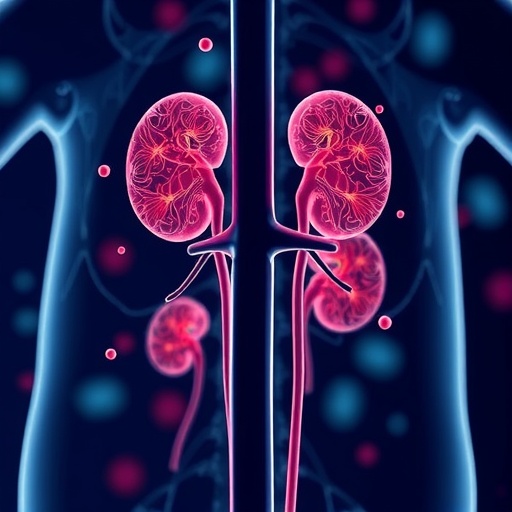In a groundbreaking study that promises to reshape our understanding of kidney functions and their management, researchers led by Lin et al. delve into the nexus of genetics and renal health. The team employed whole exome sequencing (WES) and polygenic risk assessment to unveil how genetic variations influence kidney functions in both clinical and population-based Asian cohorts. This innovative research holds the potential to not only enhance clinical outcomes but also provide individuals with a clearer understanding of their genetic landscapes.
Whole exome sequencing, a powerful tool in genomic research, focuses on sequencing the protein-coding regions of the genome. This area harbors the majority of known disease-related variants, making it an optimal choice for exploring genetic factors influencing kidney health. By investigating the exomes of thousands of participants, Lin and colleagues were able to compile a comprehensive genetic profile that sheds light on specific variations relevant to kidney function.
The importance of renal health cannot be overstated. The kidneys play a critical role in filtering waste products from the bloodstream, regulating electrolyte balance, and managing blood pressure. However, global trends indicate that kidney diseases are reaching epidemic proportions, particularly in regions with rapid urbanization and lifestyle changes. Understanding the genetic underpinnings of these conditions could offer a beacon of hope for preventive and therapeutic strategies.
In their study, the authors gathered a diverse cohort consisting of both hospitalized patients and individuals from various population-based approaches across Asia. This dual cohort design allowed them to compare and contrast the findings in different contexts, thus enhancing the robustness of their results. The multifaceted demographic landscape provided a rich tapestry of data, reflecting the genetic diversity that is characteristic of Asian populations.
As the research unfolded, it became increasingly clear that the polygenic risk assessment would play a vital role in understanding kidney function. The assessment evaluates the cumulative effect of multiple genetic variants, often referred to as single nucleotide polymorphisms (SNPs), which may individually have a minimal effect but can collectively contribute to substantial risk. By harnessing this methodology, Lin and colleagues were able to identify individuals at heightened risk of kidney dysfunction.
This predictive capability could revolutionize patient management strategies. For instance, individuals found to carry a high polygenic risk score might benefit from early interventions or more stringent monitoring of renal health. Such personalized approaches could lead to earlier detection of progressive kidney disease, allowing for timely therapeutic measures that could dramatically alter the course of the disease.
The findings of this study are not merely academic; they have real-world implications for clinical practice. With a growing recognition of the need for precision medicine, integrating polygenic risk scores into routine clinical assessments could represent a significant step forward. The understanding of genetic predispositions could enable healthcare providers to tailor lifestyle and treatment recommendations based on an individual’s unique genetic makeup.
Moreover, this research underscores the importance of genomic data in enhancing our comprehension of diseases that disproportionately affect certain populations. As the global health community continues to grapple with disparities in health outcomes, it is imperative that genetic studies like this one address underrepresented demographics, ensuring that advancements in medical science benefit all population groups.
The implications of such research extend beyond individual patient care. As academic institutions and healthcare systems alike increasingly invest in genomics and precision health, the insights from Lin et al.’s study could pave the way for initiatives aimed at population health management. Public health initiatives could leverage genetic data to design targeted educational campaigns or preventive health strategies tailored to high-risk groups.
Importantly, the impact of genetic insights on kidney health also invites a broader discussion regarding ethical considerations in genomics. As polygenic risk assessments begin to shape clinical decisions, it becomes vital to ensure that patients are equipped with adequate information to understand the implications of their genetic data. Developing strategies to communicate findings effectively will be crucial in fostering a collaborative patient-provider relationship.
As the landscape of healthcare continues to evolve with technological advancements, studies like this one highlight the significance of merging clinical practice with cutting-edge genomics. The intersection of whole exome sequencing, polygenic risk assessment, and personalized medicine heralds a new era where kidney health can be managed not just reactively but proactively. This transformative approach may serve as a model for similar explorations in other health domains, encouraging a comprehensive understanding of how genetics influences disease across varied contexts.
Looking ahead, the potential for collaborative efforts that bring together clinicians, geneticists, and public health experts can lead to richer datasets and more impactful findings. As knowledge expands, there is hope for developing innovative therapies and preventive strategies that root themselves in genetic understanding.
In conclusion, the work conducted by Lin et al. offers a vital glimpse into the future of kidney health management, merging genetics with clinical excellence. By harnessing the power of polygenic risk scores and whole exome sequencing, the medical community is poised to embark on a journey that not only enhances individual patient care but also transforms healthcare systems at large. The intersections of genetics, health, and society will undoubtedly play a pivotal role in shaping the future of renal health and disease management.
Subject of Research: Kidney functions and clinical management through genetic insights.
Article Title: Whole exome sequencing and polygenic risk assessment for kidney functions and clinical management in both hospital-based cohort and population-based Asian cohorts.
Article References:
Lin, MR., Wu, IW., Chou, WH. et al. Whole exome sequencing and polygenic risk assessment for kidney functions and clinical management in both hospital-based cohort and population-based Asian cohorts.
J Biomed Sci 32, 72 (2025). https://doi.org/10.1186/s12929-025-01168-0
Image Credits: AI Generated
DOI: 10.1186/s12929-025-01168-0
Keywords: Kidney health, whole exome sequencing, polygenic risk assessment, genomics, precision medicine.




